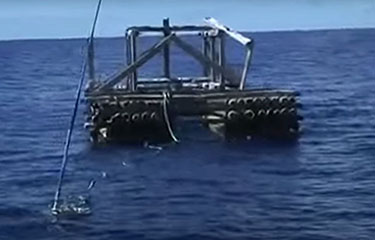At a contentious special session of the Indian Ocean Tuna Commission (IOTC), developing nations bucked pressure from the European Union and approved an annual closure period for drifting fish-aggregating devices (dFADs).
The IOTC is the regional fishery management organization (RFMO) that manages tuna fishing in the Indian Ocean. The three-day special session that ended on 5 February was held to consider a conservation and management measure on dFADs, following inaction on the issue at the IOTC regular meeting in May 2022. At that meeting, IOTC members rejected a weak E.U. proposal offering only minor reductions in the total number of deployed dFADs and a review clause that would have delayed significant changes to rules governing FAD deployment. Instead, they passed a proposal that mandated an annual 72-day closure period for dFADs; reducing the number of dFADs allowed per-vessel from the current 300 to 250 in 2024, and to 200 in 2025; and establishing mandatory FAD register.
At the opening session, Kenya, the meeting’s host nation and leader of a proposal for a temporary dFAD closure, unexpectedly withdrew support from its own proposal. The proposal’s co-sponsors put the proposal forward anyway, with Indonesia spearheading the initiative.
It is unusual for conservation measures to be decided by a simple majority vote, as in most cases, the parties try to reach a consensus. However, on the last day of the IOTC meeting, as the E.U. continued to oppose any dFAD closure, Indonesia’s proposal was put to a vote and passed with 15 of 26 votes. It will be the first time a dFAD closure has been implemented in the Indian Ocean.
Also at the meeting, a separate measure, put forward by the Maldives and Kenya on management of anchored FADs (aFADs) was adopted by consensus. It requires marking dFADs with a unique national identifying number and requires all IOTC member-states to create an aFAD management plan, keep a registry of the GPS locations of aFADs and share the lists with the IOTC. The measure also stipulates use of biodegradable materials and non-entangling/non-mesh materials for all aFADs.
Kenya cited a lack of vetting by its relevant government ministry as the reason for its withdrawal from the controversial dFAD proposal, but according to Bloom Association, a fishery conservation NGO with offices in Paris and Hong Kong, word among the delegates was that the European Commission had threatened to withhold “blue economy” aid money to Kenya if it went forward with the proposal. Through the “Go Blue” program, the E.U. is contributing EUR 24.75 million (USD 26.4 million) to Kenya for sustainable coastal economic development. The Bloom Association called the E.U.’s actions hypocritical, saying that even as the E.U. has been encouraging African countries to focus on environmental conservation, it has been undermining efforts to control dFADs, which are heavily utilized by the Spanish and French fleets in the Indian Ocean.
The E.U. threatened to object to the new resolution, and if they do so within the next 120 days, the resolution would not apply to E.U. vessels. Due to a lack of enforcement measures, any IOTC member-state can opt out of conservation measures they disagree with. As a result, proposals are typically watered down so as to avoid breaching the consensus approach typically favored by RFMO member-states, according to a November 2018 article in the journal Marine Policy titled “Innovation in the decision-making process of the RFMOs.”
“Even if a dispute settlement procedure does exist in most of these organizations and empowers any member to introduce a procedure against another member which does not agree to the adoption of such measures, such a procedure has been used only once, unsuccessfully,” the study found.
A statement from Europeche, an association of national organizations of fishing enterprises in the E.U., characterized the vote as an effort by local countries to expel the Europeans from the Indian Ocean, since it is the E.U. purse-seiners that most-heavily employ dFADs. They noted that Mauritius and the Seychelles, which have large tuna-canning industries, would also be adversely affected by a dFAD ban.
“While other fishing fleets catch more than half of the total tuna catches in the IOTC area, the whole burden is placed on purse-seiner fleets,” Europeche said. The Europeche statement also castigated the London-based NGO International Pole and Line Foundation (IPNLF) for influencing the vote, and noted the U.K. delegation supported the measure.
TBut the International Seafood Sustainability Foundation (ISSF), global coalition of seafood companies, fisheries experts, and scientific and environmental organizations promoting science-based initiatives for long-term tuna conservation, expressed concern that the strife and discord that marred the proceedings could ...
Photo courtesy of The Pew Charitable Trusts








